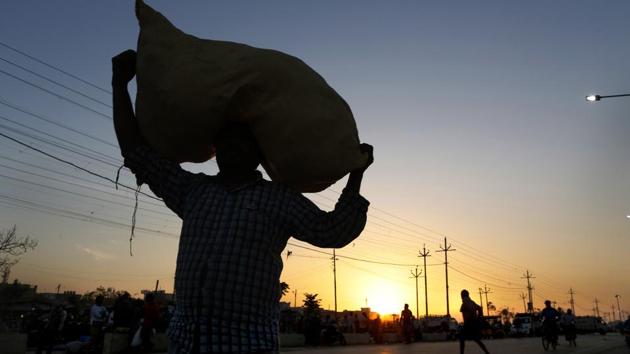Covid-19: Define social security for migrant workers | Opinion
Given the lack of legal mandates, migrant workers have been simply left to fend for themselves during a crisis as serious as a pandemic. This requires urgent correction.
Migrant workers leaving New Delhi after the lockdown’s announcement raise decades-old unaddressed questions. Who are these migrants? Why are they leaving their places of work and returning to their villages? And what rights do they have?

Migrant workers constitute a large part of the informal sector of India’s economy. There are around 60 million interstate migrant population in India, with a significant proportion being seasonal or short-term ones. According to the Report of the Committee on Unorganized Sector Statistics, 2012, they constitute 93% of the overall workforce and contribute 50% towards the Gross National Product (GNP). Yet, such a large workforce lacks clear legal protections. There are laws aimed at the informal sector, covering working conditions and social security of its workers, but none of them directly deals with jobless migrants leaving cities.
According to the Periodic Labour Force Survey (PLFS) of 2017-18, 71.1% of the workers in the non-agricultural sector with a regular salary didn’t have a written job contract; 54.2% were not eligible for paid leave; and, 49.6% for any social security benefits. The report, Employment in Informal Sector and Condition of Informal Employment of 2015, shows that 82% of those employed in both the agriculture and non-agriculture sectors (except crop and animal husbandry) didn’t have a written job contract; 77.3% didn’t get paid leave; and, 69% were not eligible for any social security benefits.
Given the lack of legal mandates, migrant workers have simply been left to fend for themselves during a crisis as serious as a pandemic. This requires urgent correction.
For context, India’s Industrial Disputes Act,1947 was enacted for the investigation and settlement of industrial disputes. However, this Act applies only to the organised sector. It was not meant to provide social security and welfare to the casual worker, and doesn’t have provisions to deal with the current situation in Delhi and other Indian cities under lockdown.
Much of this legislation was enacted soon after Independence and fails to meet the social security needs and other welfare aspects of the informal workforce today.
Take the Minimum Wages Act of 1948. It has not been effectively implemented in most parts of the country as, according to the Economic Survey 2018-19, this law does not cover all wage workers.
Among the more recent attempts at enacting protection legislation is The Unorganised Workers’ Social Security Act, 2008 is a more recent attempt at enacting protective legislation. But only about 5% to 6% are enrolled for social security benefits under it. This is because policy-framers insist on a scheme-based welfare regime rather than a statute-based social security regime.
Then there’s the Inter State Migrant Workmen Act, 1979. It mandates registration of establishments employing inter-state migrant workers, but not the workers themselves. The Act imposes obligations on the contractor employing such migrants to ensure basic labour rights. But till December 2016, it had seen merely four prosecutions.
In December 2016, the government informed the Lok Sabha that there is no data available on migrant workers in various states and that no insurance scheme has been proposed exclusively for them.
Finally, in an attempt to revamp the ecosystem of labour and industrial law, the government of India then introduced four labour codes. Among those, the draft Labour Code on Social Security & Welfare, 2018 provided for the integration of schemes and benefits across the country and recognised the rights of workers to access these benefits throughout the country. However, it dropped the word “welfare”, and diluted or omitted certain provisions regarding workers’ welfare.
Unfortunately, the latest Social Security Bill, 2019, is silent as well on whether special protections apply to migrant workers. Under the Bill, important areas such as employment injury benefits and provident fund for workers in the unorganised sector are left to the discretion of states.
To address these lacunas, here are a few steps:
One, migrant labour must be factored into any legislation or scheme on social security for unorganised workers. They must be treated at par with other workers in the destination state as well as should be allowed complete portability of welfare schemes, access to healthcare and allied benefits.
Two, instead of classifying them in various classes and categories, there should be only one class of worker. For this, the definition of workers given in Section 2.140 of the draft Labour Code on Social Security & Welfare, 2018, should be adopted.
Three, there should be a definitive move to a statute-based welfare provision from a scheme-based welfare, because the former empowers both, the latter empowers only the State.
Four, in a changing business scenario, there is a need to decode the web of complex supply chains to identify principal employers and impose on them liabilities and obligations for social protection.
Five, the business model of e-commerce, which is layered with complex architecture, should be studied and tweaked to ensure social security and welfare of the workers. Their business model avoids giving social security for workers by treating them as partners in progress but not in welfare.
Six, provide social security where there is no well-defined employer-employee relationship. For example, in MSMEs.
Nine, ensure a minimal definition of social security to all. Basic necessities such as health care, old-age security, unemployment insurance, the minimum wage should be provided by the State.
Ten, social security should be visualised and conceptualised as a preventive measure — skilling, minimum safety in occupational conditions, insurance against the pandemic, epidemic, natural disasters and climate change.
Finally, frame an implementable, accessible and reliable social security. In this regard, the self-help group model can be scaled up and provided with legal and statutory architecture.
Suman Doval is a Delhi-based lawyer and mediator. He practices Commercial & Constitutional Litigation & Arbitration
The views expressed are personal



